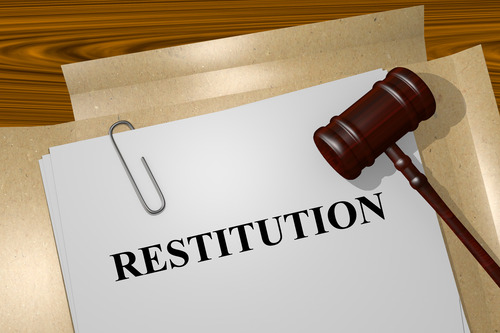At Byron Pugh Legal, we are dedicated to providing skilled and compassionate legal representation throughout Middle Tennessee. As former Nashville prosecutors, we bring extensive courtroom experience to every case, ensuring that our clients receive strong legal advocacy and fair treatment. We focus on building effective defense strategies tailored to each client’s unique situation, always striving for the best possible outcome. Whether you are facing criminal charges or need legal guidance, our team is here to fight for your rights and guide you through the legal process.
Property crime convictions in Tennessee often result in restitution orders, which require offenders to compensate victims for stolen or damaged property, financial loss, lost wages, and medical expenses. Courts enforce restitution payments to ensure victims recover their losses while holding defendants accountable. Understanding how restitution works, how courts determine restitution owed, and what happens if payments are not made can help both victims and those facing charges navigate the legal process.
In this blog, we explain how restitution works in Tennessee property crime cases and why working with an experienced Nashville property crimes attorney can help protect your rights and ensure fair restitution payments.
Understanding Property Crime and Restitution
Property crimes involve the theft, damage, or destruction of another person’s property. Courts order restitution to compensate victims for their financial loss. Understanding how property crime convictions and restitution payments work in Tennessee helps both defendants and victims know what to expect.
Common Property Crimes in Tennessee
Tennessee law classifies property crimes based on severity. Common property crimes include burglary, grand larceny, felony theft, and financial crimes. More severe property crimes involve large financial losses, unauthorized entry, or violence during the crime.
Misdemeanor property crimes often involve personal property valued below a legal threshold. Felony property crimes result in harsher penalties, including jail time, substantial fines, and a restitution order.
What Restitution Covers
A restitution order requires the defendant to compensate the victim. Courts calculate restitution owed based on the stolen property, property damage, lost wages, and medical expenses. Unlike substantial fines, which go to the government, restitution payments go directly to the victim.
Restitution may cover:
- Stolen property: The defendant must pay for or return else’s property.
- Damaged property: The court may order payment for destruction or repairs.
- Lost wages: If the crime caused the victim to miss work, the offender must compensate for those wages.
- Medical expenses: If the crime resulted in injury, the restitution payments cover medical costs.
Restitution vs. Other Criminal Penalties
Restitution is separate from criminal penalties like fines, probation, or prison sentences. A criminal case determines guilt, while restitution orders focus on compensating the victim. The court may impose both penalties for the same offense.
In Tennessee, a defense attorney can argue against restitution amounts if they believe the prosecution’s case overstates the property valued or financial loss. However, failure to pay restitution can result in enhanced penalties or violations of the offender’s probation.
Legal Basis for Restitution in Tennessee Property Crime Cases
Tennessee law requires defendants convicted of property crimes to compensate victims through restitution payments. The court determines the restitution owed based on the financial loss suffered by the victim.
Tennessee Restitution Law (TCA § 40-35-304)
Tennessee Code § 40-35-304 outlines the court’s authority to issue a restitution order in property crime convictions. The law states that courts must consider:
- The property valued at the time of the crime.
- The stolen property or damaged property requiring compensation.
- The victim’s lost wages and medical expenses related to the crime.
A restitution order becomes part of the defendant’s probation or sentence. Failure to pay restitution can result in harsher penalties, including extended probation or jail time.
How Courts Determine Restitution Amounts
The court assesses restitution payments based on evidence from the prosecution’s case and the victim impact statement. Key factors include:
- Theft amount: The value of personal property stolen or destroyed.
- Property damage: The cost of repairing or replacing else’s property.
- Financial loss: Lost income or medical expenses resulting from the crime.
The court may adjust the restitution order based on the defendant’s ability to pay. However, a defense attorney must present evidence proving financial hardship to seek a reduction.
Restitution as a Condition of Probation
In many property crime convictions, courts impose restitution payments as part of the offender’s probation. This means the defendant must make payments according to a set schedule. If the offender fails to pay restitution, the court can revoke probation and impose jail time.
How Restitution is Determined and Collected
Tennessee courts decide restitution payments based on the financial loss suffered by the victim. The court enforces restitution orders to ensure the offender repays the cost of stolen property, damaged property, lost wages, and medical expenses.
Factors Courts Consider in Restitution Orders
The court reviews evidence to determine the restitution owed. Factors include:
- Property valued at the time of the crime.
- The cost of repairing or replacing damaged property.
- Lost wages due to injury or inability to work.
- Medical expenses caused by the crime.
The prosecution’s case presents these costs, often supported by a victim impact statement. A defense attorney can dispute restitution payments if the amount is inflated or lacks proof.
Methods of Collecting Restitution Payments
Tennessee courts enforce restitution orders through different collection methods. These include:
- Court-supervised payment plans: Defendants make scheduled restitution payments.
- Wage garnishment: The court deducts restitution owed from the offender’s income.
- Seizure of assets: The court may use the defendant’s personal property to satisfy restitution payments.
Failure to pay restitution can lead to harsher penalties, including jail time or extended probation. Courts monitor compliance to ensure victims receive compensation.
Consequences of Non-Payment
If the defendant does not comply with the restitution order, the court may:
- Extend offender’s probation until full payment is made.
- Increase substantial fines or impose additional penalties.
- Revoke probation, resulting in prison time.
Consequences of Failing to Pay Restitution
Tennessee courts enforce restitution payments to ensure victims recover their financial loss. Failure to pay restitution can lead to harsher penalties, including probation violations, fines, and jail time.
Probation Violations and Extended Supervision
In many property crime convictions, courts include restitution payments as part of the offender’s probation. If the defendant does not make payments, the court can:
- Extend probation until the restitution owed is fully paid.
- Impose stricter probation conditions to enforce compliance.
- Require additional court appearances to monitor progress.
Increased Fines and Legal Penalties
If the defendant refuses to pay restitution, the court may impose substantial fines or take legal action to collect the debt. Possible penalties include:
- Wage garnishment to deduct payments directly from the offender’s income.
- Seizure of personal property to cover unpaid amounts.
- Additional court fees that increase the total financial loss.
Revocation of Probation and Jail Time
A restitution order is a legal obligation. If the offender fails to comply, the court can revoke probation and impose a prison sentence. This is common in cases where the defendant:
- Misses multiple restitution payments without justification.
- Ignores court orders to appear for payment hearings.
- Fails to work or take action to satisfy restitution owed.
Defending Against Excessive Restitution Orders
Tennessee courts issue restitution orders to compensate victims for their financial loss. However, some defendants may face restitution payments that exceed the actual property valued or damaged property costs. A strong defense can help reduce restitution owed.
Challenging Overstated Restitution Amounts
A criminal defense attorney can dispute a restitution order if:
- The prosecution’s case inflates the value of stolen property or property damage.
- The victim impact statement includes unverified lost wages or medical expenses.
- The requested restitution payments exceed actual financial loss.
Evidence such as appraisal reports, receipts, and expert testimony can help challenge an excessive restitution order.
Arguing Inability to Pay
Tennessee courts consider a defendant’s ability to pay when setting restitution payments. A defense attorney can request:
- A lower restitution amount based on the offender’s income.
- A longer payment plan to prevent financial hardship.
- A hearing to adjust restitution owed if circumstances change.
Courts may modify restitution payments but will still require some form of compensation.
Filing for Restitution Reduction
A defendant can file a motion to reduce restitution payments if:
- The restitution order includes unverified expenses.
- The offender has completed part of the payments and can no longer afford the remainder.
- New evidence proves the restitution owed was miscalculated.
A court hearing is required to approve any modifications. Defendants facing charges should consult a criminal defense attorney to ensure the best legal strategy.
Contact an Experienced Nashville Property Crimes Lawyer Today!
If you are facing charges for a property crime in Tennessee or believe your restitution order is unfair, our team at Byron Pugh Legal is here to help. Restitution payments can place a heavy burden on defendants, but with the right legal strategy, you may be able to reduce the amount owed or secure a more manageable payment plan. An experienced Nashville property crimes attorney can review your case, challenge excessive claims, and fight for a fair resolution.
Contact us at 615-255-9595 for a free case consultation today!






